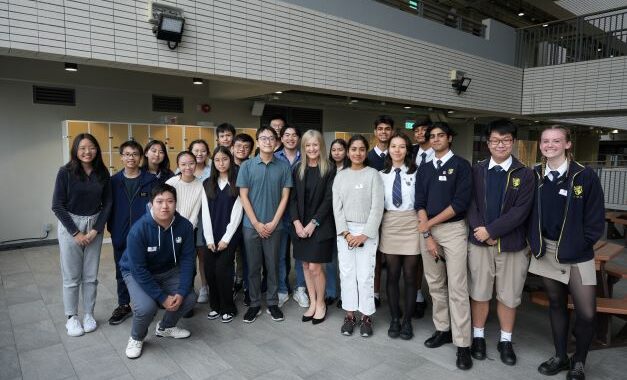ESF Student Council: Nurturing Tomorrow’s Leaders
The ESF Student Council convened with Mrs Belinda Greer, ESF CEO, at Island School on Friday, 10th February 2023.
Attended by over 20 select student leaders from across the English Schools Foundation, the Student Council constitutes the interests of 18,000 students from across 22 schools. Island School was represented by Angela Chen (13D), Sam Hui (13W), Joseph Lau (13D), Hannah Wu (12D), and Airi Tachino (12D).
This body has a trifold purpose: to garner student and key stakeholder feedback for senior management, to address student-focused issues throughout ESF, and to act as a consultative entity where student voice is taken into account promptly during the organisation’s decision-making process. Accordingly, the Council not only enables a better understanding of student concerns but also facilitates active problem-solving and the inclusion of accurate and constructive student feedback into ESF’s operations.
Mrs Belinda Greer, Chief Executive Officer of the English Schools Foundation, commented on the work of the Student Council this year. “I welcome student engagement and the perspective this brings to shaping ESF and influencing our future. The ESF Student Council 2022/23 has successfully empowered student agency and voice. I want to congratulate them for building momentum for cross-school initiatives and for establishing collaboration among our students. The Chair of the Council, Sam Hui (13W) has provided a strong steer and unstinting commitment to the Council. Together, Sam and the Council members have achieved much. They now pass the baton onto the newly elected ESF Student Council 2023/24 which is well- positioned to build on the work.”
Initiating the discourse with a review of the existing processes to encourage student agency, Sam explained the importance of more efficient operations of Student Councils across schools. Student leaders across ESF proposed that leadership positions should be more clearly defined, providing students with lucidity and certainty regarding whom they should contact if they have any inquiries.
In the meeting, Mrs Greer expounded on the significance of student involvement, opinions and ideas in aiding to form and guide the organisation. She accentuated the utility of the Student Council in bringing together senior students from across ESF, emphasising the heterogeneous leadership structure and how the Council acts as a podium for students to share concepts with one another and to collaborate with ESF strategically to concentrate on development. In addition, she spoke of addressing the impacts of the pandemic on the students and ESF’s dedication to providing a holistic learning experience for its students, including the use of technology. She concluded her remarks by expressing that these are now exceptionally exciting times and that it is important for students to hold conversations on matters that they feel passionately about so that this can be communicated to ESF effectively.
Representatives went on to address the necessity of augmenting transparency in current systems, proposing that student feedback could be more expeditiously and directly transmitted to the Principal and Student Council through new student voice collection mechanisms. Furthermore, they proposed establishing centralised avenues for students interested to kickstart projects, giving them staff support and guidance throughout the process.
They then considered the importance of inspiring young students to become leaders in areas of their ardour when they enter school. They supported the notion that students should be able to take on leadership roles in areas of their interest, shaping their own unique and distinct learning pathways. To ensure students are cognizant of their roles, student leaders across schools also explored the possibility of developing leadership-focused training sessions for aspiring leaders.
The ESF Student Council’s meeting was a tremendous success, leaving attendees with a greater understanding of the importance of student leadership and the role it plays in ESF. Through the introduction of student voice collection mechanisms, increased transparency and training for leaders, ESF is taking steps to ensure that all students have the opportunity to become strong, effective leaders. Furthermore, with the support of the Senior Leadership Team and Heads of Years, there is the potential for ESF to create a culture that encourages and inspires young students to become leaders in areas they are passionate about.
Ultimately, the ESF Student Council’s meeting has provided a platform for student leaders to come together, share ideas and collaborate, with the aim of improving the overall student experience and making ESF a better place. Taking student feedback into consideration, ESF is set to make significant strides in the realm of student leadership, cultivating the leaders of tomorrow.

